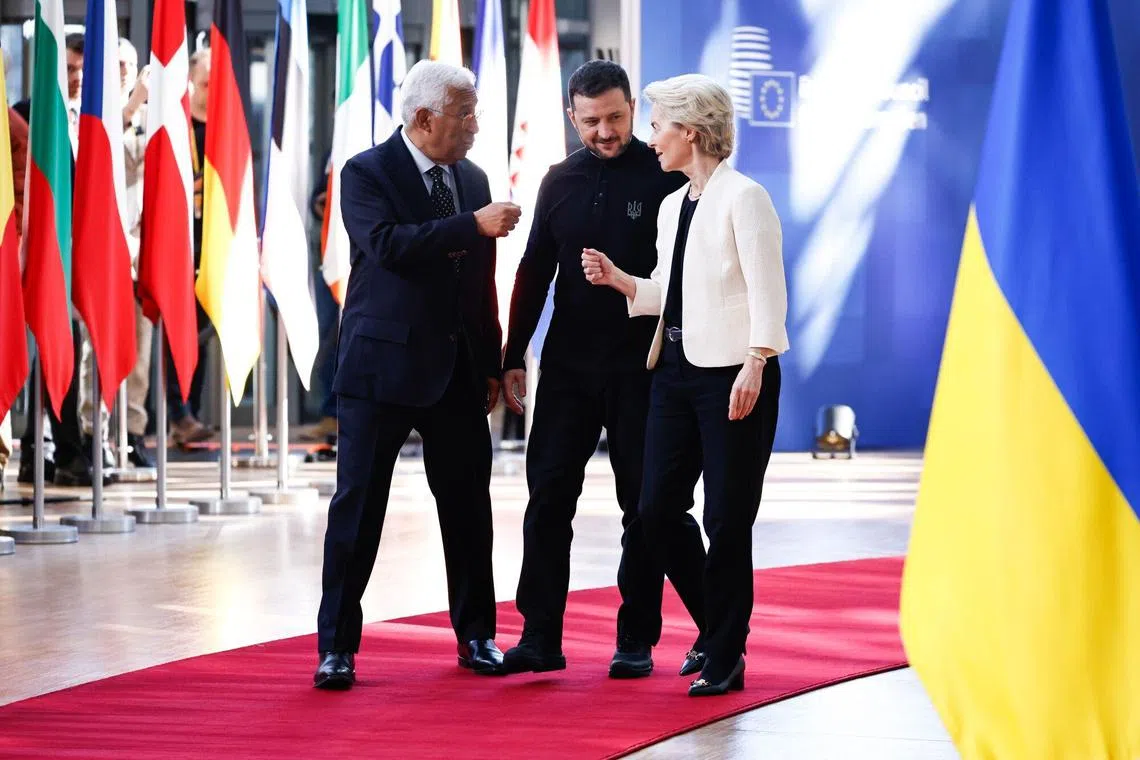‘We are not alone’: Zelensky thanks Europe at crisis summit
Sign up now: Get ST's newsletters delivered to your inbox

European Council president Antonio Costa (left) speaks to Ukraine president Volodymyr Zelensky and EU Commission president Ursula von der Leyen in Brussels on March 6.
PHOTO: BLOOMBERG
BRUSSELS - Ukrainian President Volodymyr Zelensky thanked EU leaders on March 6 for standing by Ukraine as the bloc held crisis talks on confronting US President Donald Trump’s pivot away from Kyiv and its transatlantic partners.
March 6’s European summit comes a week after a White House blow-up between Mr Trump and Mr Zelensky
“We are very thankful that we are not alone. And these are not just words,” the Ukrainian president said as the Brussels meeting kicked off, standing alongside EU chiefs Ursula von der Leyen and Antonio Costa.
With America’s long-term commitment to Europe’s security now in doubt, the bloc faces immense pressure to rise to the moment.
Already this week, Germany’s likely next leader pledged a historical U-turn on defence.
Dr Von der Leyen, who has laid out a plan aimed at mobilising €800 billion (S$1.15 trillion) to “re-arm Europe” faced with the threat from Russia, called it “a watershed moment” for the continent.
“Europe faces a clear and present danger, and therefore Europe has to be able to protect itself,” the commission chief told reporters.
“It’s also watershed moment for Ukraine,” she added. “We have to put Ukraine in a position to protect itself, and to push for lasting and just peace.”
Leaders are expected to give a green light on March 6 to the commission’s defence plans, based largely on freeing states to spend much more – something the bloc’s two economic powerhouses look set to do.
In a sombre national address on the summit’s eve, France’s President Emmanuel Macron called for a defence spending surge to confront a “new era” and said he would discuss extending France’s nuclear deterrent to European partners – an idea swiftly welcomed by key eastern power Poland.
“Who can believe that this Russia of today will stop at Ukraine?” Mr Macron asked. “I want to believe that the United States will stay by our side, but we have to be prepared for that not to be the case.”
Germany’s chancellor-in-waiting Friedrich Merz, who conferred with EU chiefs in Brussels ahead of the talks, has declared himself ready for “the worst-case scenario” and embraced radical reforms to pump up German defence spending.
‘Coalition of the willing’
Mr Zelensky’s visit to Brussels comes as he scrambles to re-engage Washington after the White House blow-up – declaring himself ready to work towards a peace deal
But Germany’s outgoing leader Olaf Scholz reiterated European warnings against any “dictated peace” in Ukraine.
A future settlement must guarantee Kyiv’s “sovereignty and independence”, he said.
Mr Trump’s outreach to Russian President Vladimir Putin to end the three-year war – sidelining both Kyiv and its European partners – has thrown Europe into crisis mode as it contemplates the possibility of a more lasting withdrawal of US security support.
It has also helped draw Britain back into the European fold, five years after leaving the EU.
Now Prime Minister Keir Starmer is working in tandem with Mr Macron to rebuild bridges between Mr Trump and Mr Zelensky.
Mr Starmer and other European leaders made a show of embracing Mr Zelensky at weekend talks in London that brought in Nato’s secretary general and non-EU partners such as Turkey.
EU chiefs will be briefing the British leader after the Brussels summit.
France and Britain have pitched a one-month truce “in the air, at sea and on energy infrastructure” and are calling for a “coalition of the willing” to help secure a future ceasefire.
Turkey indicated on March 6 it could play a part in peacekeeping efforts.
Leaders in Brussels are to start thrashing out more broadly what “security guarantees” the bloc might provide for a peace deal.
That could include the deployment of European troops, something several states support, but which Russia reiterated on March 6 it would not accept.
But while Mr Zelensky can expect strong signals of support, the meeting is unlikely to yield major new announcements of aid for Kyiv, beyond the €30 billion the bloc has already committed for 2025.
Several states argue Europe currently has enough money committed to meet Kyiv’s needs – despite the US freeze on aid. AFP


